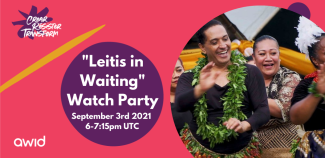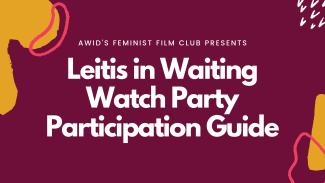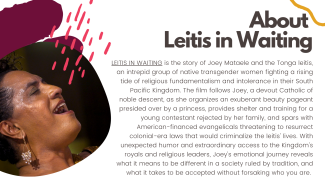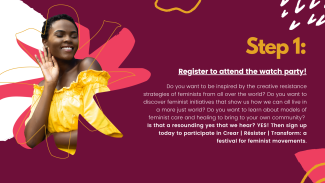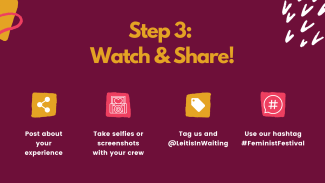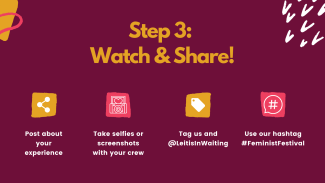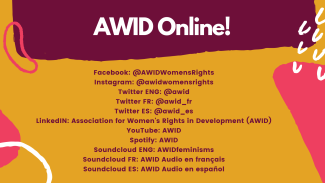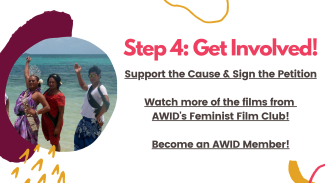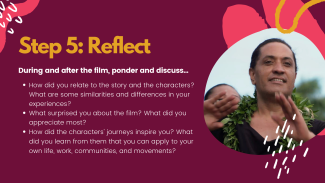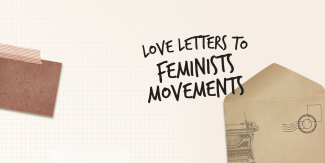Advancing Universal Rights and Justice
Uprooting Fascisms and Fundamentalisms
Across the globe, feminist, women’s rights and gender justice defenders are challenging the agendas of fascist and fundamentalist actors. These oppressive forces target women, persons who are non-conforming in their gender identity, expression and/or sexual orientation, and other oppressed communities.
Discriminatory ideologies are undermining and co-opting our human rights systems and standards, with the aim of making rights the preserve of only certain groups. In the face of this, the Advancing Universal Rights and Justice (AURJ) initiative promotes the universality of rights - the foundational principle that human rights belong to everyone, no matter who they are, without exception.
We create space for feminist, women’s rights and gender justice movements and allies to recognize, strategize and take collective action to counter the influence and impact of anti-rights actors. We also seek to advance women’s rights and feminist frameworks, norms and proposals, and to protect and promote the universality of rights.
Our actions
Through this initiative, we:
- Build knowledge: We support feminist, women’s rights and gender justice movements by disseminating and popularizing knowledge and key messages about anti-rights actors, their strategies, and impact in the international human rights systems through AWID’s leadership role in the collaborative platform, the Observatory on the Universality of Rights (OURs)*.
- Advance feminist agendas: We ally ourselves with partners in international human rights spaces including, the Human Rights Council, the Commission on Population and Development, the Commission on the Status of Women and the UN General Assembly.
- Create and amplify alternatives: We engage with our members to ensure that international commitments, resolutions and norms reflect and are fed back into organizing in other spaces locally, nationally and regionally.
- Mobilize solidarity action: We take action alongside women human rights defenders (WHRDs) including trans and intersex defenders and young feminists, working to challenge fundamentalisms and fascisms and call attention to situations of risk.
Related Content
Snippet - WITM Why now_col 1 - PT
Por que devo responder à pesquisa agora?

Os movimentos feministas, de direitos das mulheres, de justiça de género, de LBTQI+ e de aliados em todo do mundo encontram-se num momento crítico, e enfrentam uma forte retaliação contra direitos e liberdades conquistados anteriormente. Os últimos anos trouxeram o crescimento rápido do autoritarismo, a violenta repressão da sociedade civil e a criminalização dos defensores dos direitos humanos das mulheres e de pessoas de género diverso, o aumento da guerra e do conflito em várias partes do nosso mundo, a perpetuação contínua de injustiças económicas e crises de saúde, da ecologia e do clima interligadas.
Research methology
Over eight years, we did four global surveys and built a research methodology.
In 2013, we published three global reports. These reports confirm that women’s rights organizations are doing the heavy lifting to advance women’s rights and gender equality by using diverse, creative and long-term strategies, all while being underfunded.
Our 2010 global survey showed that the collective income of 740 women’s organizations around the world totaled only USD 104 million. Compare this with Greenpeace International, one organization with a 2010 budget of USD 310 million1. Imagine the impact these groups could have if they were able to access all the financial resources they need and more?
AWID’s WITM research has catalyzed increased funding for women’s rights organizing. WITM research was a driving force behind the Catapult crowdfunding platform, which has raised USD 6.5 million for women’s rights. The Dutch Government cited WITM research as a reason for its unprecedented MDG 3 Fund of EU 82 million. WITM research has also led to the creation of several new funds: FRIDA – The Young Feminist Fund, the Indigenous Women’s Fund, Fundo Elas, the Mediterranean Women’s Fund and the Rita Fund.
Funding trends analyses
While the WITM research has shed important light on the global funding landscape, AWID and partners have identified the need to dig deeper, to analyze funding trends by region, population and issue. In response, organizations are now using AWID’s WITM research methodology to do their own funding trends analyses. For example, in November 2013, Kosova Women’s Network and Alter Habitus – Institute for Studies in Society and Culture published Where is the Money for Women’s Rights? A Kosovo Case Study.
At the same time, AWID continues to collaborate with partners in Where is the Money for Indigenous Women’s Rights (with International Indigenous Women’s Forum and International Funders for Indigenous Peoples) and our upcoming Where is the Money for Women’s Rights in Brazil? (with Fundo Elas).
Several organizations have also conducted their own independent funding trends research, deepening their understanding of the funding landscape and politics behind it. For example, the South Asian Women’s Fund was inspired by AWID’s WITM research to conduct funding trends reports for each country in South Asia, as well as a regional overview. Other examples of research outside of AWID include the collaboration between Open Society Foundations, Mama Cash, and the Red Umbrella Fund to produce the report Funding for Sex Workers Rights, and the first-ever survey on trans* and intersex funding by Global Action for Trans* Equality and American Jewish World Service.
Snippet - WITM RESOURCES - RU
Ресурсы
(Доступно на английском языке)
Reclaiming the Commons
Definition
There are varied conceptualizations about the commons notes activist and scholar Soma Kishore Parthasarathy.
Conventionally, they are understood as natural resources intended for use by those who depend on their use. However, the concept of the commons has expanded to include the resources of knowledge, heritage, culture, virtual spaces, and even climate. It pre-dates the individual property regime and provided the basis for organization of society. Definitions given by government entities limit its scope to land and material resources.
The concept of the commons rests on the cultural practice of sharing livelihood spaces and resources as nature’s gift, for the common good, and for the sustainability of the common.
Context
Under increasing threat, nations and market forces continue to colonize, exploit and occupy humanity’s commons.
In some favourable contexts, the ‘commons’ have the potential to enable women, especially economically oppressed women, to have autonomy in how they are able to negotiate their multiple needs and aspirations.
Feminist perspective
Patriarchy is reinforced when women and other oppressed genders are denied access and control of the commons.
Therefore, a feminist economy seeks to restore the legitimate rights of communities to these common resources. This autonomy is enabling them to sustain themselves; while evolving more egalitarian systems of governance and use of such resources. A feminist economy acknowledges women’s roles and provides equal opportunities for decision-making, i.e. women as equal claimants to these resources.

Learn more about this proposition
- Reclaiming the Commons for Gender and Economic Justice: Struggles and Movements in India is an interview to scholar Soma Kishore Parthasarathy on how women in rural India are contesting this reality by proposing a shared management of common resources.
- Feminism And The Politics Of The Commons by Silvia Federici looks at the politics of the commons from a feminist standpoint shaped by the struggle against sexual discrimination and reproductive work, to clarify the conditions under which the principle of the common/s can become the foundation of an anti-capitalist program.
Part of our series of
Feminist Propositions for a Just Economy
Quem deve participar no inquérito?
Grupos, organizações e movimentos cujo foco específico ou principal seja os direitos das mulheres, de jovens, a justiça de género, os direitos das pessoas LBTQI+ e de aliados em todas as regiões e em todos os níveis, quer sejam novos ou já estabelecidos.
When development initiatives, religious fundamentalisms and the state of women’s rights collide
Our new research paper The Devil is in the Details addresses knowledge gaps around religious fundamentalisms within the development sector, and aims to improve understanding of how they constrain development and women’s rights in particular. It provides recommendations for ways development actors can avoid inadvertently strengthening and instead challenge fundamentalisms. [CTA download link: Read the full paper]
Seven pointers to consider
| Graphic1 | 1. Control of women’s bodies, sexuality, and choice are “warning signs” of rising fundamentalisms. |
| 2. Neoliberal economic policies have a particularly negative impact on women, and fuel the growth of religious fundamentalisms. | Graphic2 |
| Graphic3 | 3. Choosing religious organizations as default for partnerships builds their legitimacy and access to resources, and supports their ideology, including gender ideology. |
| 4.Everyone has multiple identities and should be defined by more than just their religion. Foregrounding religious identities tends to reinforce the power of religious fundamentalists. | Graphic4 |
| Graphic5 | 5. Religion, culture, and tradition are constantly changing, being reinterpreted and challenged. What is dominant is always a question of power. |
| 6. Racism, exclusion, and marginalization all add to the appeal of fundamentalists’ offer of a sense of belonging and a “cause”. | Graphic6 |
| Graphic7 | 7. There is strong evidence that the single most important factor in promoting women’s rights and gender equality is an autonomous women’s movement. |
There has been a growth in the power and influence of religious fundamentalist actors globally.
The Devil is in the Details details the grave human rights violations, and violations of women’s rights in particular, caused by state-sponsored fundamentalism, as well as by fundamentalist non-state actors such as militias, religious community organizations, and individuals. Fundamentalist reinforcement of regressive, patriarchal social norms are leading to the rise of violence against women, girls, and women human rights defenders (WHRDs). The paper highlights these key insights for addressing the problem:
- [icon] Religious fundamentalisms are gaining ground within communities
- [icon] Political systems
- [icon] International arenas with devastating effects for ordinary people, women in particular.
There is an urgent need to act for development actors.
Development actors are in a position to take a strong role in this. The collective capacity of development actors to recognize and collaboratively address religious fundamentalisms is vital for advancing social, economic, and gender justice and the human rights of all people in sustainable development. It is vital to promote intersectional feminist understandings of power and privilege, and to apply these to questions of religion and culture. Women’s organizations already have knowledge and strategies to counter fundamentalisms development actors should build on this, and invest in cross-issue coalitions to help them reach new heights.
هل على مجموعتنا، منظمتنا أو حركتنا تعبئة الاستطلاع مع أننا لم نحشد أو نأخذ تمويلاً من ممولين/ات خارجيين/ات؟
نعم! نلاحظ ونقدّر الأسباب المختلفة لعدم تلق الحركات النسوية التمويل الخارجي، حيث من الممكن أن تكون غير مؤهلة لتقديم الطلبات للتمويل و\ أو تلقّي المال من خارج البلاد، أو الاعتماد على المصادر التي يتم إنتاجها بشكل مستقل كاستراتيجية سياسية. نريد أن نسمع منكم/ن بعيدا عن تجربتكم/ن مع التمويل الخارجي.
Why did AWID choose Taipei as the location for the Forum?
AWID spent close to two years working to identify a Forum location in the Asia Pacific region (the Forum location rotates regions).
Building on initial desk research and consultations with allies that led us to rule out many other options in the region, we organized a thorough round of site visits to Nepal, Malaysia, Sri Lanka, Thailand, Indonesia and (later) Taiwan.
Each site visit included not just scoping the logistical infrastructure but meeting with local feminist groups and activists to better understand the context, and their sense of potential opportunities and risks of an AWID forum in their context.
In our site visits, we found incredibly vibrant, diverse local feminist movements.
They often expressed conflicted feelings about the opportunities and risk that the visibility of an event like the Forum could bring to them. In one, during the first 30 minutes of our meeting we heard unanimously from the activists gathered that an AWID Forum would be subject to huge backlash, that LGBTQ rights were a particular political hot-button and that fundamentalist groups would turn out in full force to interrupt the event. When our response was “ok, then you don’t feel it’s a good idea”, again the unanimous response was “of course it is, we want to change the narrative!”.
It was difficult to hear and see in some of these places how many feminist activists wanted to leverage the opportunity of a visible big event and were prepared to face the local risks; but our considerations as hosts of close to 2,000 people from around the world impose a different calculation of risk and feasibility.
We also grappled with questions of what it means to organize a feminist forum that is aligned to principles around inclusion, reciprocity and self-determination, when state policy and practice is usually directly counter to that (although officials in the ministries of Tourism work very hard to smooth that over).
We weighed considerations of infrastructure, with potential opportunity to tip momentum on some national level feminist agendas, and national political context.
In many of these places, monitoring the context felt like an exercise on a pendulum that could swing from open and safe for feminist debates in one moment to stark repression and xenophobia the next, sacrificing feminist priorities as political bargaining chips to pacify right wing, anti-rights forces.
The process has been a sobering reflection on the incredibly challenging context for women’s rights and gender justice activism globally.
Our challenges in Asia Pacific led us to consider: would it be easier if we moved the Forum to a different region? Yet today, we would not be able to organize an AWID Forum in Istanbul as we did in 2012; nor would we be able to do one in Brazil as we did in 2016.
With all of this complexity, AWID selected Taipei as the Forum location because:
- It offers a moderate degree of stability and safety for the diversity of Forum participants we will convene.
- it also has strong logistical capacities, and is accessible for many travellers (with a facilitated e-visa process for international conferences).
- The local feminist movement is welcoming of the Forum and keen to engage with feminists from across the globe.
In organizing the AWID Forum, we are trying to build and hold space as best we can for the diverse expressions of solidarity, outrage, hope and inspiration that are at the core of feminist movements.
At this moment, we see Taipei as the location in the Asia Pacific region that will best allow us to build that safe and rebelious space for our global feminist community.
The fact is, there is no ideal location in today’s world for a Forum that centers Feminist Realities. Wherever we go, we must build that space together!
Моего языка нет в списке и мне сложно заполнить опрос – что мне делать?
AWID стремится к языковой справедливости, и мы сожалеем, что на данный момент проведение опроса на большем количестве языков не представляется возможным. Если вам нужна помощь в переводе или вы хотите заполнить анкету на любом другом языке, пожалуйста, свяжитесь с нами по адресу witm@awid.org
Leitis in Waiting Watch Party Participation Guide
O nosso grupo não recebeu qualquer financiamento nos três anos entre 2021 e 2023. Devemos preencher o questionário mesmo assim?
Sim, ainda queremos a sua resposta, independentemente de terem recebido financiamento em três, dois, um, ou qualquer um dos anos entre 2021 e 2023.
Anti-Rights Discourses
Chapter 3
Anti-rights discourses continue to evolve. As well as using arguments related to religion, culture, and tradition, anti-rights actors co-opt the language of social justice and human rights to conceal their true agendas and gain legitimacy.

Alison Howard, Alliance Defending Freedom, speaks outside the construction site of the Washington, D.C. Planned Parenthood.
Three decades ago, a US television evangelist and Republican candidate famously said that feminism is an “anti-family political movement that encourages women to leave their husbands, kill their children, practice witchcraft, destroy capitalism and become lesbians.” Today, this conspirative notion gains unprecedented grasp and legitimacy in the form of “gender ideology” discourse, a catch-all bogey-man created by anti-rights actors for them to oppose.
Across a range of discourses employed by anti-rights actors - including notions of “cultural imperialism” and “ideological colonization”, appeals to “conscientious objection” and the idea of a “pre-natal genocide” - a key theme is co-optation. Anti-rights actors take legitimate issues, or select parts of them, and twist them in service of their oppressive agenda.
Table of Contents
- Gender Ideology
- Cultural Imperialism and Ideological Colonization
- Abortion: Conscientious Objection
- Abortion: Prenatal Genocide
- Exercise: Let’s Take Back the Narrative
- Movement Resistance Story: The Nairobi Principles: Cross-Movement Commitments on Disability and SRHR
لماذا تسألون عن اسم المجموعة، المنظمة و\ أو الحركة التي تعبئ الاستطلاع؟
نسأل عن هذه المعلومات كي نسهّل عملية المعالجة وكي نستطيع أن نتواصل مع مجموعتكم/ن في حالة لم تستطيعون تكملة الاستطلاع و\ أو في حالة كانت لديكم/ن شكوك أو أسئلة إضافية. يمكنكم/ن قراءة المزيد عن كيف نستعمل المعلومات التي نجمعها خلال عملنا هنا.
عودةٌ إلى ذواتنا
شكرًا انجيلا وبيار

 |
يانيا صوفيا غرسون ڤالنسيا، أنا امرأة سوداء أعمل في مجال رأب صدع المُجتمع. أعيش في سنتاندر دي كيليتشاو في كاوكا في كولومبيا. مهتمّة بالعمليات الإبداعية التي تنظّم الحياة الجماعية المستدامة. أحبّ تبادل الأفكار والطبخ، والتحقيق والتحليل، وزرع البذور والتعلّم من النباتات، والقراءة واللعب. أقوم حاليًا بتنسيق مرصد العنف القائم على النوع الاجتماعي ضد المجتمعات المنحدرة من أصول إفريقية في كولومبيا (@VigiaAfro). |

كنّا نحن الثلاثة «نتشارك» فترة الأصيل في حيٍّ جنوبي بوغوتا.
كنّا أخيرًا نعيش ذلك النوع الآخر من الحبّ – ذاك الحبّ حيث نجلس معًا لمجرد السعادة في أن نكون معًا، ونصغي لبعضنا الآخر. بالنسبة إليّ، هذه الأنواع من الدردشات كانت ضمن تعابير الحبّ التي أتاحت لي الحياة أن أستمتع بها حديثًا فقط. ما كنت أعرف أن هذه الأشكال الأخرى ممكنة – تلك التي توجَد خارج نطاق ورشات العمل، أو أماكن الناشطين أو غرف الصفّ أو أماكن العمل. نحن، ثلاث صديقات، أمضينا فترة الأصيل معًا ولم يكن اختلاف لون بشرتنا بأمرٍ تظاهرنا أننا لم نلحظه، لا بل كان عنصرًا واقعيًا أتاح لنا أن نناقش بحرارة نقاط التشابه والاختلاف في التجارب التي خضناها في مرحلتي طفولتنا وشبابنا.
كنّا نحن الثلاثة «نتشارك» فترة الأصيل في حيٍّ جنوبي بوغوتا. كانت هناك مساحة خضراء كبيرة خُصّصت للّعب، شيء لم نألفه، جلسنا على مقاعد خشبية بدون مسند للظهر تحت شجرة بيلسان. كنّا أخيرًا نعيش ذلك النوع الآخر من الحبّ – ذاك الحبّ حيث نجلس معًا لمجرد السعادة في أن نكون معًا، ونصغي لبعضنا الآخر. بالنسبة إليّ، هذه الأنواع من الدردشات كانت ضمن تعابير الحبّ التي أتاحت لي الحياة أن أستمتع بها حديثًا فقط. ما كنت أعرف أن هذه الأشكال الأخرى ممكنة – تلك التي توجَد خارج نطاق ورشات العمل، أو أماكن الناشطين أو غرف الصفّ أو أماكن العمل. نحن، ثلاث صديقات، أمضينا فترة الأصيل معًا ولم يكن اختلاف لون بشرتنا بأمرٍ تظاهرنا أننا لم نلحظه، لا بل كان عنصرًا واقعيًا أتاح لنا أن نناقش بحرارة نقاط التشابه والاختلاف في التجارب التي خضناها في مرحلتي طفولتنا وشبابنا.
لم تكن تلك الدردشات مرتبطة بأية مهمّة وشيكة لحركة السود في كولومبيا، لكنها لا تنفكّ تمنحني القوة وتكتسب معانٍ جديدة. اشتدّت أواصر علاقتنا مع لقاءاتنا المتكررة، ومعرفة كلٍّ منّا للأخرى بشكل أفضل وتمييز فرادة تحرّرنا. ومعرفة أنّ التحرّر ليس حكرًا على مسلك واحد فقط ويمكن أن يتمّ عبر عدة مسالك – هذه المسالك التي مشيناها في كل مرّة قلنا «لا» وتمرّدنا. لم يخالجنا أي شعور بالانزعاج، إنما شعور بالأصالة المصنوعة من الضعف والقوة، شعور جَمَعَنا بدل أن يفرّقنا وقرَّبَنا من بعض أكثر.
كان هدفنا في فترة الأصيل الجميلة تلك، أن نكون نحن – ذاك الوعي أن نكون أنفسَنا ومع أنفسِنا. استذكرنا ماضينا فكانت الذكريات التي بقيت معنا هي تلك التي اخترنا نحن الاحتفاظ بها، وليس التي زرعها الخوف في أنفسنا. تذكّرنا مقتطعات معيّنة من مسلسلات تلفزيونية، وغنّينا أغنيات كتبها فنّانون علّمونا عن الحبّ المتناهي، والكره الشديد، والشتم كما يفعل الأشرار، والمعاناة كمأ تختبرها النساء في مواقع القيادة. أخبَرْنا بعضنا عن المقالب المدرسية، تلك التي بقيت في لاوعينا الذي كان مُنكشفاً على شتّى الطُرق التي ينتهجها الإعلام لإعادة بثّ انطباعات مُعيّنة، وعلى قصص الراهبات والمُعلّمات وما حملته من تطلّعاتٍ حياتيةٍ ترسمها معايير سندريلا. تلك العوامل هي ما حدّد إيقاع بقية القصة: مأساة الفتاة الفقيرة المسلوبة والمُهانة، والتي ستعيد لاحقًا إعتبارها من خلال فعلٍ يحرّرها من الحالة التي تعيشها. إعادة الإعتبار تلك لا تتحقق إلا إذا وقَعَتْ عينا رجل أبيض البشرة (على أقل تقدير) عليها – فيستحقّ ما بين فخذيها (وهو ما يتطلّع إليه أساسًا). وهكذا تتحوّل أحلامنا إلى حقيقة بشكلها الأمثل – قالوا لنا إنّ ذاك هو ما يجب أن نصبو إليه.
كنّا ثلاثتنا هناك ذاك الأصيل. كلٌّ منّا نشأت في منطقة مختلفة من البلاد، لكن ولدهشتنا، كنّا ثلاثتنا نقتبس مقتطعات وأحداث من أغانٍ ومسلسلات كانت لها غالباً نفس الرموز والشعارات مع بعض التحويرات الموائمة لبيئة منازلنا وعلاقاتنا الأولى، والأحياء التي عشنا فيها ومدارسنا. لاحظنا كلّ هذه التقاطعات والتحويرات من خلال كلامنا معاً وتعمّق معرفتنا ببعضنا الآخر. إنها النشأة في ظل ّوبإسم الـ «دراما» – أوليس هذا هو الوصف الذي كان يُطلق على المدرسة الإخراجية الناجحة تلك؟ – تلك المدرسة (الـ»جانر») التي تقول إن تَعاظُم معاناتكِ يحدّد ما تستحقّين. بكلمات أخرى، يطرح هذا الجانر المسألة التالية: كيف وبأية حالات يحقّ لكِ ويكون مقبولًا أن تعاني؟ فمعاناتكِ (وهذا شيء بالغ الاهمية)، هي الوصيةُ على سلوكياتك، إنها تُحدّد ما يجب أن يظهر عليه المرء المُعذَّب، وما هي الأفعال التي يجب أن تقوم بها ومَن عليها أن تكون. نجح بعضنا في تحرير أنفسهن و»تعلّمنا» أن تعريفنا الخاص للحبّ يمكن فقط تعلّمه في سن الرشد، وفي تهشيم أوهامنا، وفي تقبّل الخطيئة الطبيعية وفي الوعي بوجود آلة إنتاج عالميةٍ لنموذج العذرية التي قد نختار رفض التماثل بها لأنها وبكل بساطةٍ لا مكانة لها في إدراكنا وفي خيباتنا المتولّدة من الواقع التغريبيّ.
بعد الغناء، راجعنا بدايات استكشافاتنا الجنسية. لم يخطر لي يوماً أن معظم الناس خَبِروا تلك الأحاسيس قبل عمر التاسعة، وأنه حتى في سن الرشد تلك الاستكشافات، تلك الذكريات، تبقى حِملاً ثقيلًا. حتى في أيامنا هذه، في الكثير الكثير من الأماكن، ملايين الفتيات والفتيان يعتبرون براءتهم مُختصَرة بأجسادهم. إلقاء اللوم على الفضول هي آلية الضبط الأكثر فعالية. عدنا بالذاكرة إلى المحادثات المختصرة التي دارت بيننا عندما غيّرنا تاريخ حياتنا من أشخاص سود مُحقَّرين، إلى مفهومٍ أعاد ولادتنا من جديد. تذكَّرنا كيف أن العديد من زوجات أقاربنا وبناتهن، تركن منازلهن وانتمائهن وجذورهن بحثًا عن مستقبل في الخارج، في مكان آخر.

لم يأتِ المستقبل بلا ثمن، لأنه أَجبَر إعادة تشكيلٍ لتلك العلاقات التي وصمت طفولتنا، وحَبَسَها في غرف النسيان. إنها الأُسس التي نشأنا عليها، لكنها لم تكن دافعنا لنتقدّم. منبع التقدّم بالنسبة لنا كان إدراكنا بجوارحنا ما يستوجب علينا فعله للوصول إلى مكان اخر، فاقترنت فكرة التقدّم «بفُرصةٍ» للابتعاد عمّا في داخلنا، في محاولةٍ للاقتراب من الخارج البعيد. دفعت العديدات من زوجات أقاربنا وبناتهن، أثماناً باهظةً مُقابل تلقّف فرصةٍ للتسجيل في ومتابعة صفّ مسائي مثلاً، أو أخذ إجازة من العمل المنزلي. أثمانٌ مسّت بجنسانيّاتِهنّ، أثمانٌ هنّ أنفسهنّ وأخريات قبلهن سَبَق ودفعنها وربما تناسينها. وكان تسديد هذا الثمن أمراً حتميّاً، أشبه بتسديد فاتورة خدمات المرافق العامة. لكننا لن نرضخ لهذا الإرث.
في كولومبيا وأميركا اللاتينية، كان هناك دليل عن آداب السلوك وكان عنوانه «دليل آداب السلوك للكاتب كارينيو». كان ذاك الدليل مقرّرًا إلزاميًا للقراءة في المدراس الرسمية والخاصة حتى التسعينيات. وكانت أمّي، التي تتلمذت وتربّت على أيدي الراهبات الكرمليات، حفظته عن ظهر قلب: والدليل حدّد فعليًا كيف كان مفهوم الجسد. عندما قرأتُه للمرة الأولى، توقّفتُ أكثر من مرّة لأفرك معدتي التي آلمتني من شدّة الضحك. كان يحتوي على تعليمات سخيفه مثل: خذي دوشاً وعينيك مغمضتين، واطفئي النور لترتدي ملابس النوم. وتناولت عدّة فصول فيه كيفية التصرّف في المنزل، وفي الشارع وخلال حفل عشاء أو غداء – باختصارعادات الذوق الرفيع وآداب السلوك. النواة الأخلاقية للمواطنين الصالحين، الحضارة التي أتاحت للإنسان الابتعاد عن الحياة الريفية. الدليل ذاته أشار إلى أنّ إلقاء التحية بصوت عالٍ لأحد المعارف على الجهة الأخرى من الشارع أمر مشين، أداب السلوك تقتضي أن تَعبري الشارع. وعلى المنوال نفسه، على الرجال أن يخلعوا معاطفهم ويضعوها فوق بِرَك الماء الضحلة عندما يكونون بصُحبة امرأة تفادياً لابتلال حذائها. وهنا أدركتني خاطرة: بلادنا حارّة ولا نحتاج إلى ارتداء المعاطف، فما الحلّ إذا ما اضطررتُ إلى إلقاء التحية على أحدٍ على الضفة المُقابلة من النهر؟!
السيد كارينيو ذاك، هو شخصيةٌ مُختلفةٌ جوهرياً عن شخصية جدّ إحدى السيدات اللواتي وُلدن في تيوربو. أخبرتني ذات مرّة أنّ جدّها كان رجلًا حكيمًا، فقد علّمها عن الولادة وكيف تعتني بجسدها. تعلّمت أنها ولتعتني ببطنها، عليها الحفاظ على دفء جسدها، وتفادي البرد الذي يتسلل إلى نفوخ الرأس والقدمين والأذنين، لكي لا تشعر بألم أثناء المساء. لذلك عليكِ التنبّه لنوع الأطعمة التي تتناولينها وتلك التي يجب ألا تتناولينها، كما عليك التنبّه للملابس التي ترتدينها ولطريقة سيرك، لأن كلّ ذلك له علاقة بصحة الفتيات. قالت المرأة المسنّة أنها تعلّمت من جدّها المتفاني، أنّ المغص أصبح أكثر شيوعًا عندما لم تعد أرضيات المنازل مصنوعة من التربة و/ أو الخشب. عندما بدأ استخدام الباطون والبلاط، وعندما أصبحت المواد التي يتكوّن منها المنزل، تسمح للبرد بالدخول إلى الجسم من القدمين، ما أدّى إلى ازدياد اضطراب أنسجة البطن.
تفاجأتُ مرة أخرى، بالفرق الشاسع ما بين دون كارينيو والجدّ الحكيم فيما يتعلّق بإدراكهما للحياة. شاسعٌ هو الفرق، كبُعد إرشادات السلوك الجيّد التي تكبت دوافعك وحواسك، عن الأفعال المنطقية التي تصون صحّة الجسد. في تلك اللحظة، استطعت أن أدرك الطرق العديدة التي يكتم فيها الباطون نفَسَ الأرض وأنفاسنا كجزء من هذه الأرض، ولكن في بعدٍ مختلف. لم أكن أعرف من قبل أنّ مواداً وهندسات معمارية معيّنة، كانت وما زالت، تعتني بأجسادنا. في كولومبيا، كما في بلدان أخرى، كانت المواد المستخدمة لبناء البيوت، تُعتبَر مؤشرات للفقر المتعدّد الجوانب. فقد كان البيت الذي بُني من الباطون يعني أنّ قاطنيه ليسوا فقراء على الأرجح. هذا مجرد مثال آخر مثيرٍ للإحباط، يُظهر كيف أن التقدّم دَفَعَنا للتخلّي عن العلاقة بين بيوتنا وأجسامنا. الذوق الرفيع والتمدّن دفعا بنا للخروج عن ذواتنا: التقدّم يستوجب منك، كما زعموا كاذبين، الذهاب إلى هناك، إلى ذاك الخارج.
استطعت أن أدرك الطرق العديدة التي يكتم فيها الباطون نفَسَ الأرض وأنفاسنا كجزء من هذه الأرض، ولكن في بعدٍ مختلف. لم أكن أعرف من قبل أنّ مواداً وهندسات معمارية معيّنة، كانت وما زالت، تعتني بأجسادنا.
أزعَجَنا أنّ أحدًا من أهلنا، لا أمّهاتنا ولا أبائنا، تكلّموا معنا عن العادة الشهرية، قبل أن تلطّخ البقعة الحمراء الداكنة لباسنا الداخلي. ولم ينجحوا في حمايتنا من الشعور بالخجل، الذي يُفترض أن يكون شعوراً طبيعياً يرافق ظهورالعادة الشهرية. بدأت تشنّجات البطن والتي غالبًا ما كنّا نتحمّلها بصمت، فقد كان هناك دائماً عمل ما يجب إنجازه. كانت بعض التشنّجات نتيجة حويصلات أو ورم دموي أوأورام ليفية، كثيراً ما كانت السبب في موت الجدّات، أولئك اللواتي اكتشفنَ العلاجات ونسينهنّ، ومع الوقت أصبحن هنّ أنفسهنّ من المنسيّات. وبدأت أمهاتنا وأباؤنا بالقلق أكثر فأكثر. وجمّد الخارج شعورهم بالألفة والودّ، فبدلًا من أن يُدفئوا بطوننا، وضعوا الأحكام وأغدقوا النصح الذي كان أقرب لتحذيرات مما وصفوه «بالشيء الوحيد الذي يهمّ الرجال» – كلّ الرجال – مشرّعين بذلك الدور السالب للفالوس، وكأنّما خياره الوحيد هو ابتكار (إزالة البكارة) ما بين ساقينا. النسخات العديدة لتلك الحقيقة، استُبدلت بتطبيع ثابت وعميق لفكرة أنّ علينا جميعاً كنساء المحافظة على أنفسنا لواحد من بين الرجال، لذلك الرجل الأول الذي سيدفع قضيبه داخلنا، للرجل الذي سيعطينا شيئًا بالمقابل. وقالوا بأننا نساء فقط لأننا نطمح لذلك، ونسمح له بدخولنا. ولكنني كفتاة استكشفت عددًا من القضب والبظور، وخلال الألعاب التي كانت الفتيات تمارسنها، كان السؤال هذا يُهمس مرارًا: من التي ستلعب دور الرجل، ومن ستلعب دور المرأة الآن؟ وكانت الإجابة تتمثل في بدايات نشوات صغيرة، دون الاكتراث بالشخص الذي نتبادلها معه. أعتقد أن الأمر نفسه كان يحدث بين أجساد الذكور.

تجارب واستكشافات زوجات أقاربنا وبناتهن ورفيقاتهن، ركّزت على أنّ الجسد وعُريّه شيء مُحرّم. فتحاشَين التعبير عنها أو تسميتها، لدرجة أنهن أخفيَنها، واستخدمن أسماء جديدة للدلالة على إفرازات أجسادنا وانبعاثاتها وعملية الإنجاب والضمّ والاحتواء التي تقوم بها، وتلك الأخيرة منوطة بنا نحن النساء فقط. ذات مرّة سمعت سيدة في سياق ورشة عمل، تقول إنها عندما كانت تعيش مع جدّتها، انطبعت في ذاكرتها صورة لامرأة عجوز تنام بعينٍ مفتوحة والأخرى مغمضة وبندقية إلى جانب الفراش. وكان أي صوت ولو خافت أثناء الليل، كفيلٌ بإيقاظها، لتنهض مُستنفرةً مصوبةً بُندقيتها. كان هذا أمرًا شائعًا على الخط الساحلي الكولومبي المُطلّ على المحيط الهادئ، حيث طُبّع مع أنماط السلوكيات العدائية/ المؤذية. كان الرجال، المتزوّجون أو العُزّاب، إن أعجبتهم إمرأة شابّة يدخلون غرفتها في الليل – كنّا نُطلق على تلك الظاهرة اسم الزحف (gateada). كانت تلك مخاطرة: فبغض النظرعمّا إذا كان الفعل تحرّشًا أم لا، إنّ تنبّه ربّ المنزل لما يحدث كان ليكلّف ذلك الرجل صحّته أو حياته.
أخفق النهج الاجتماعي الداعي لأن يستعيد المرء حقّه بيده، فلم يستطع وضع حدٍّ لعمليات الزحف (gateada)، حتى أيامنا هذه. في ورشة العمل نفسها، كما دأبت على إخبار شقيقاتي، قالت مشاركات أخريات بأنهن، لا هنّ ولا والداتهن، لن يتركن بناتهن لوحدهن مع آباءهن وقت الاستحمام، إلا إذا كانت البنات ترتدين سراويلهن الداخلية. عندها تذكّرت صوت أبي وهو يقول، عندما كنت فى السابعة من العمر، أمّك لم تسمح لي يومًا بتحميمك. في سياق ذاك الحديث أضافت امرأة، بعكس ذلك، كان والدها يُحمّمها وهي عارية في باحة الحيّ حيث كانت تسكن حتى بلغت السابعة من العمر، ومن ثم أصبح شقيقها الأكبر يقوم بذلك حتى بلغت التاسعة من العمر. لم تشعر بإي أمرٍ غريب في نظراتهما إليها، فقد كان ذلك بالنسبة لهما مهمة أخرى للإهتمام بالطفل الأكثر دلالاً في المنزل. فكُلّ ما كانت تذكره، هو أنهم كانوا ينظرون إليها على أنها الطفلة الإبنة، والطفلة الأُخت، التي كانت تكره المياه.
فاجأتنا كالعادة قصص طفولات الماضي والحاضر، وتلك القصة بالذات فاجأتنا وأدخلت الراحة إلى نفوسنا في آن معاً. حتى أنني قد رأيت طُرُقاً مختلفةً في سير الأمور، فوالد ابنتي على سبيل المثال كان يُحممها في المغطس، واستمرّ في القيام بذلك حتى بلغت الثانية من العمر. حتى قبل أن تبلغ الثانية، كان يصفعها صفعات قليلة خفيفة على مؤخرتها كي تصبح أكبر، كما قال. يمكننا هنا الحديث عن أبعاد أخرى للكيفية التي تُبنى بها أجسادنا، لكن هذه قصة مختلفة. بالنسبة لي، كان موضوع الاستحمام مجرد مهمة أخرى، من بين العديد من المهام التي قرّرنا توزيعها فيما بيننا كما اتفقنا قبل ولادة الطفلة. لا يعني أن الرجال لا يُمكن أن يكونوا مُغتصبين، لكن بإمكانهم عدم القيام بهذا السلوك. كما أنّ هنالك رجالاً تربّوا على أن لا يكونوا يومًا بمغتصبين.
ما زالت هذه الأمور تحدث. حدثت لصديقة لنا ولإبنتي. وخطر لي: كيف يمكن أن تعيش بعض النساء مع رجال لا يسعهم إئتمانهم على بناتهم؟ أنا متأكدة أنّ أمي كانت تحبّ أبي. وبرغم أننا قلّما تكلّمنا عن المرأة التي كانتها قبل أن تصبح أمي، أعرف أن تجاربها مع الاستغلال والإساءة لا تُقارَن بالوحشية والإفراط في العضّ على الجُرح في أيامنا هذه. لكن هذا قرار على الكثير من النساء اتخاذه في العديد من الأماكن، وهذا يقودنا إلى أسئلة أُخرى. كم من المرّات، وكم تكرّرت حالات الإساءة الجنسية ضمن العائلات الممتدّة، إلى حدّ أن تجعل النساء يمنعن علنًا أو ضمناً الآباء من تحميم بناتهم؟ هل الأمر عائد إلى الضخ الإعلامي الذي يُحاصرنا منذ ولادتنا؟ كيف تبهت الروابط العائلية متحوّلةً إلى مجرّد مبادلات لرضى جسدي؟ هل هو القرب من القيم المدنية التي تعلّق أهمية بالغة على الشكل الجميل لجسم المرأة كمصدر لإثارة الرغبة وتدفع أجسام الرجال للتصرف وكأنها المالكة والغازية، مُتماثلين بذلك مع الصور النمطية التي يقدّمها الإعلام، فيتصالحوا مع طبيعة هويتهم الجنسانية؟ أهو الباطون وغيره من العناصر التي تُرافقه، مثل آداب السلوك لكارينيو، التي تُحصن وتُديم تلك النمطيات؟ هل يُصار إلى تشجيعها بالحاجة إلى نسيان بعض العلاقات التي كانت ثمنًا للتقدّم، ذاك الإصرارعلى «العمل للوصول إلى ذاك الخارج المُهيمِن»؟ ماذا حدث للأمور التي تعلّمناها في زمننا، أولئك منّا اللواتي، في السرّ أو العلن، خُضن تجارب جنسية أثناء طفولتنا؟ هل محاها الشعور بالذنب؟ هل تحوّلت لبذور عدم ثقة وخجل من الجسد العاري؟ هل تحوّلت لبذور عدم ثقة وخجل من التصالح مع ذواتنا؟ ولكن ألا يُمكن لتلك التعاليم الدفينة أن تكون مصدراً لبناء الثقة، وتشكيل فهمٍ واحترامٍ للجسد العاري وللذات وللآخر؟ ترشح هذه الأسئلة ضمن المساحات الآمنة، حيث يتبدد خوف المرء من المُجاهرة بما يُفكر ويشعر، على أملِ العثور على وصال صادق. فتخيّلن كم من قصةٍ شبيهةٍ بقصصنا تركد في زوايا هذا العالم المُظلمة. إنني أجزم أن ما طرحناه من أسئلةٍ ليس بجديد، وأنّ عِبرة ما قيل ليست سوى تكرار، وأننا سنجد الإجابات في كلّ ما نحياه.


Explore Transnational Embodiments
This journal edition in partnership with Kohl: a Journal for Body and Gender Research, will explore feminist solutions, proposals and realities for transforming our current world, our bodies and our sexualities.

التجسيدات العابرة للحدود
نصدر النسخة هذه من المجلة بالشراكة مع «كحل: مجلة لأبحاث الجسد والجندر»، وسنستكشف عبرها الحلول والاقتراحات وأنواع الواقع النسوية لتغيير عالمنا الحالي وكذلك أجسادنا وجنسانياتنا.
Когда будут доступны результаты опроса?
Мы проанализируем ответы, чтобы получить представление о тенденциях, и представим результаты на 15-м Международном форуме AWID в Бангкоке, а также в режиме онлайн, в декабре 2024 года. Зарегистрируйтесь для участия в Форуме здесь!
Love letter to Feminist Movements #2
To my beloved Feminist collective,
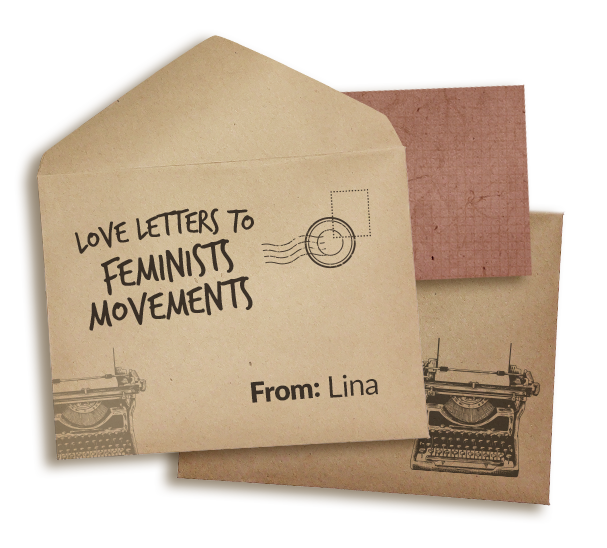
I have belonged to you for as long as I can remember. As a young girl, I did not know there was a word -feminist- for us people, who aspire to overcome and dismantle the patriarchy, who seek refuge in the arms of inclusion and intersectionality, who treat people as equals regardless of their gender, race, sexuality, religion, and ethnicity, who are constantly learning to do better, to be better and to use their privilege to uplift others.
When I was 14, my middle school French teacher, a 6ft tall thirty-year-old man, assaulted a female student in my class in front of all of us. The student, who was a childhood friend of mine, and several girls in my class went to the headmaster to report him, parents got involved, and the entire class of 30 students vouched for the girl. But all our attempts to hold him accountable failed and the administration covered up the girl’s story and he never got fired or persecuted. The girls in my class and I were outraged so we did what every young raging feminist would do. WE EGGED HIS CAR! and though the eggs get washed off easier and the paint we used to write “Pig” and “Khamaj '' -scumbag- needed to get scrubbed off. I will never forget how that made us girls feel. Liberated, enraged, happy, close-knit, and in power. The same feeling replicates in every feminist setting I have been in ever since. The teen feminist in me grew up to join Women Deliver, AWID, Unootha, facilitate feminist workshops at university, and even get persecuted for my feminist affiliation at 19, but that’s another story for another letter.
Feminist movements and spaces offer me safety and empowerment. They are the mothers we wished we had and the link we needed to connect and organize ourselves despite our differences against a common enemy that has been undermining everyone, patriarchy. It is through you that I learned to be resilient and to gather my strengths and skills and direct them towards uplifting others and bringing to light the marginalized and giving a voice to the voiceless.
What I love most about you, feminist movements is that you mess up sometimes, you disregard and marginalize as well, you have bias as does every other movement but what makes you different is that you always strive to be better. Accountability is not something you’re afraid of and you are an ever-changing collective that reflects how altruism and philanthropy in the effort of gender equity change as time passes.
May you always grow, may you do better, may you always rage, may you always roar, may you always love, may you always speak different tongues, and may you always be in power.
Love, light, and rage,
Lina
AWID Community Blurb
Join our online community!
The AWID Community is an online social networking platform specifically for AWID. It is a feminist space for connection, resistance and celebration. A space for critical feminist conversations, collective power and solidarity. It is also a space for post-event dialogues, navigating difficult political learnings and community care.
Join AWID membership to be part of the AWID Community today.
Who can fund my women’s rights organizing?
Our funder database is currently under revision. We know feminists still need and deserve more and better resources!
Please join our mailing list to stay informe about this update.
You can also become a member and find and create connections with feminists around the world.

